 09-07-2013, 05:06 PM
09-07-2013, 05:06 PM
|
#1 (permalink)
|
|
Master EcoModder
Join Date: Jan 2008
Location: Sanger,Texas,U.S.A.
Posts: 16,379
Thanks: 24,466
Thanked 7,403 Times in 4,797 Posts
|
Fairings and drag
Here are some pictorial drag tables I did at the Aero Forum.
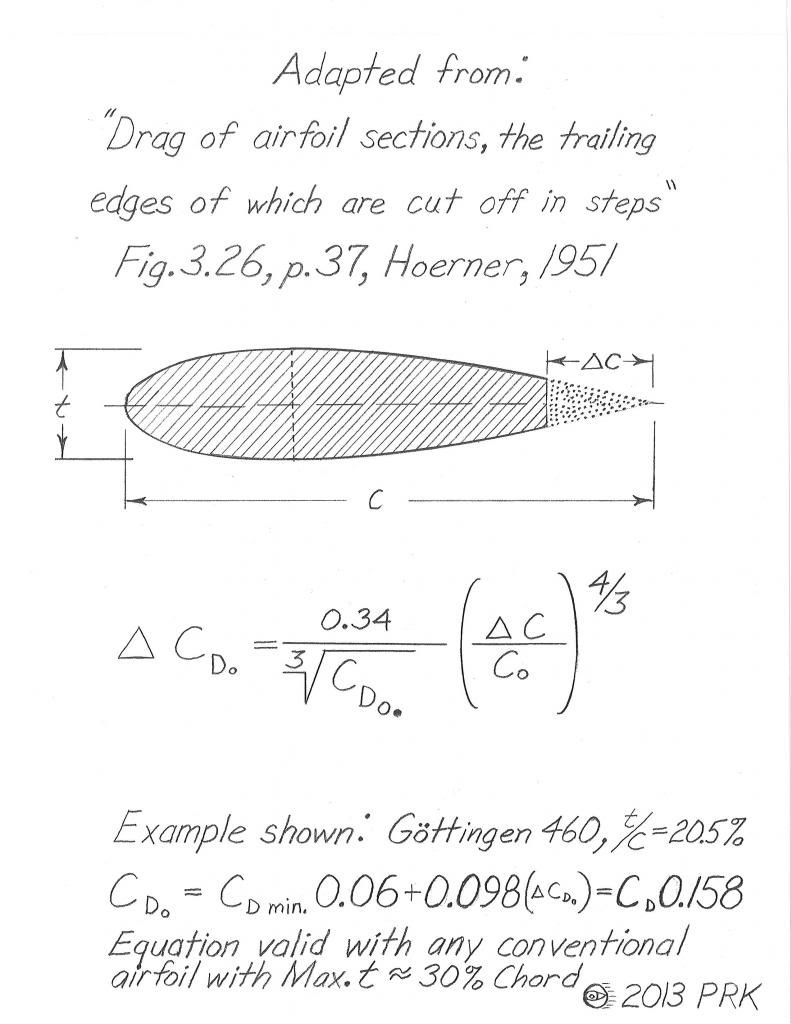
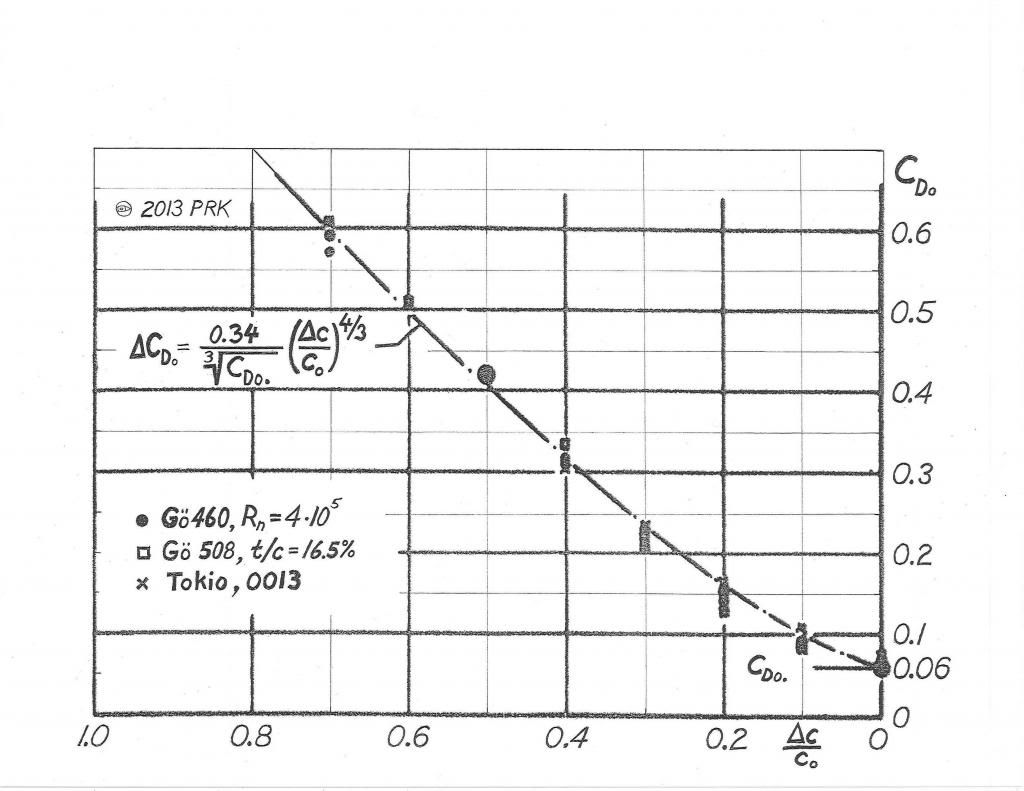
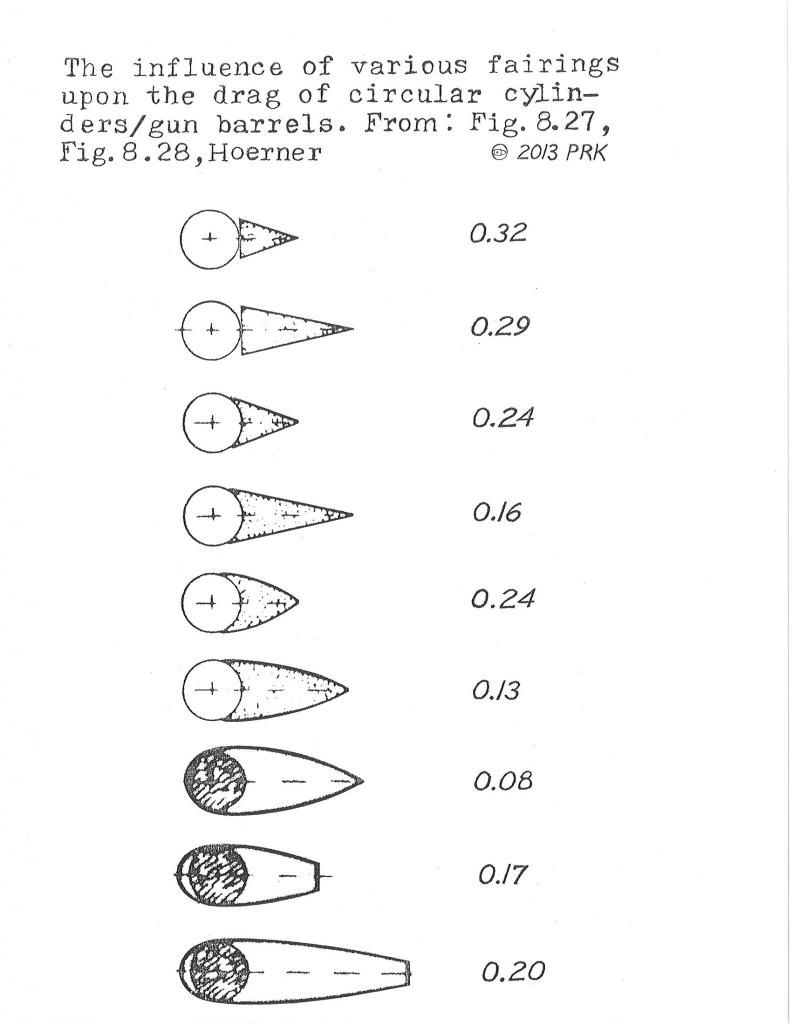
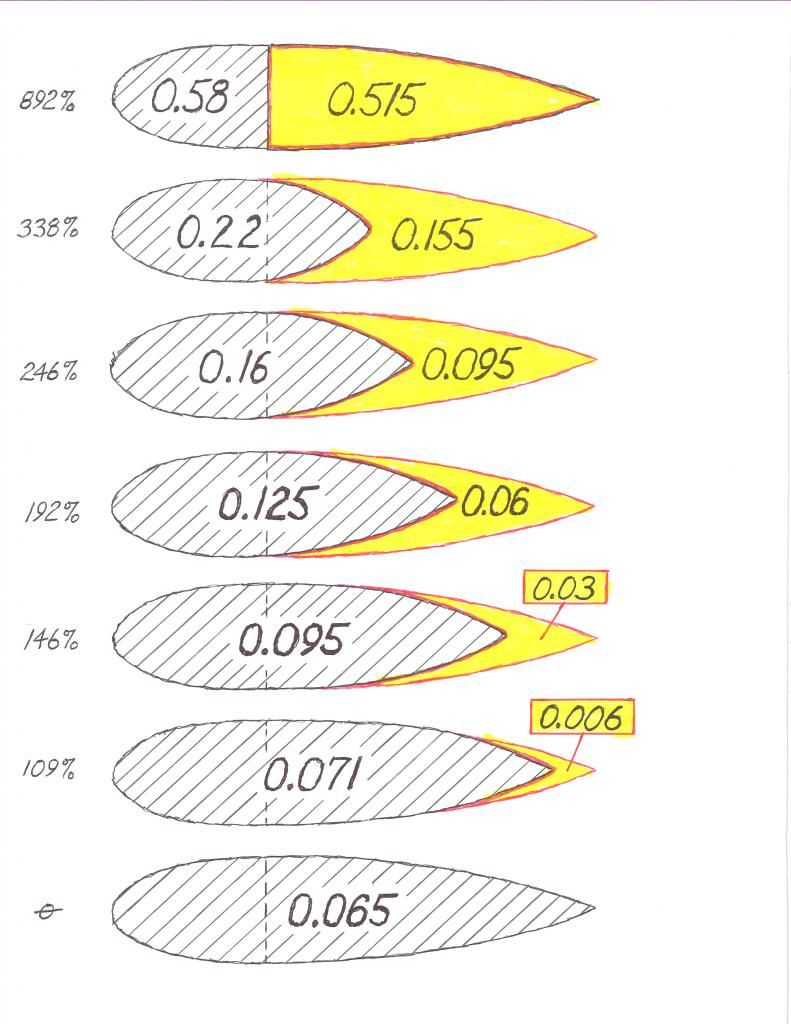





Hope they help
PS the bottom table was a rush job.The values enclosed within the boundary of the sections are their drag coefficients for each configuration shown.
The values for the yellow portions are a Cd value assigned to the section wake itself.
These values were measured at the FKFS under the leadership of Dr.Ing.Wunibald I.Kamm.
And you'll notice that the 'Kamm' bread-slice truncation produces a larger drag than the J-form (Jaray) boat-tailed truncation,for wing/strut section only.
For streamline body of revolution-based half-bodies,you WANT to use the 'Kamm' type chop-off.
Here is a fuselage drag table from Hoerner,1951
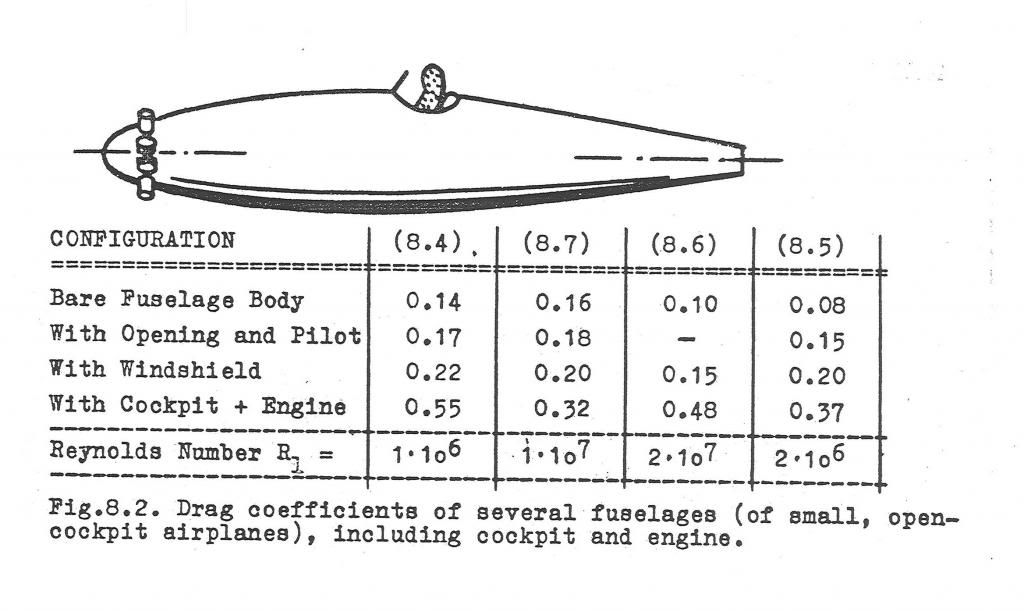
Here's another table from Hoerner
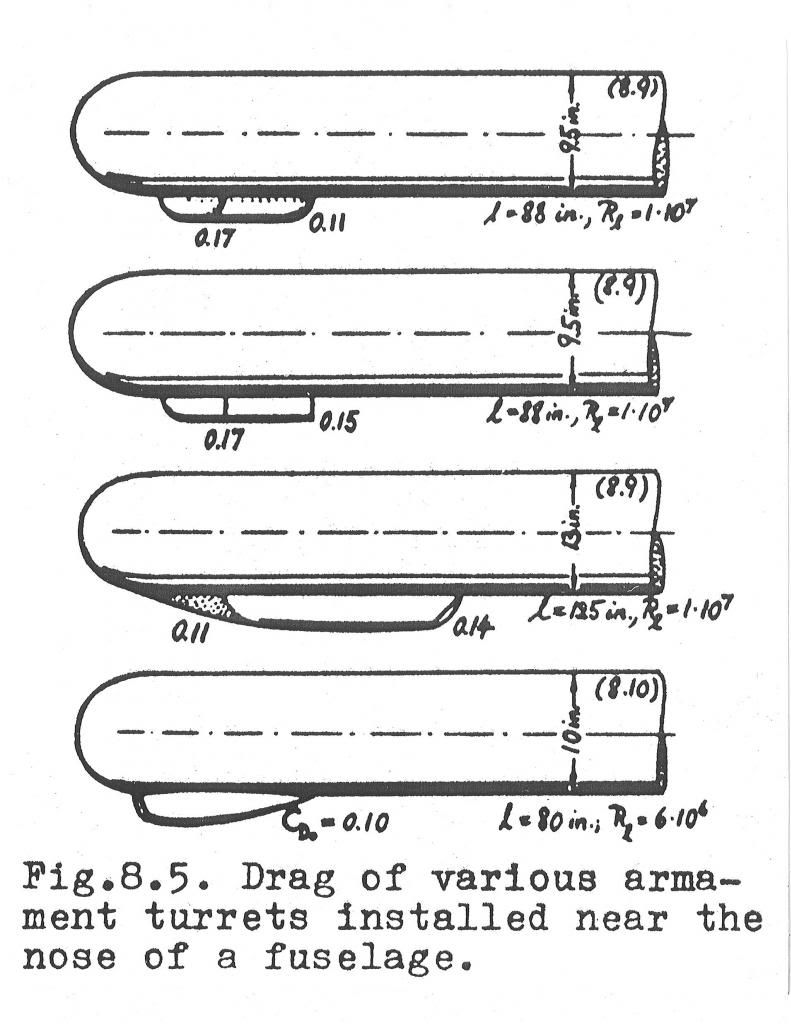
Here's another from Hoerner
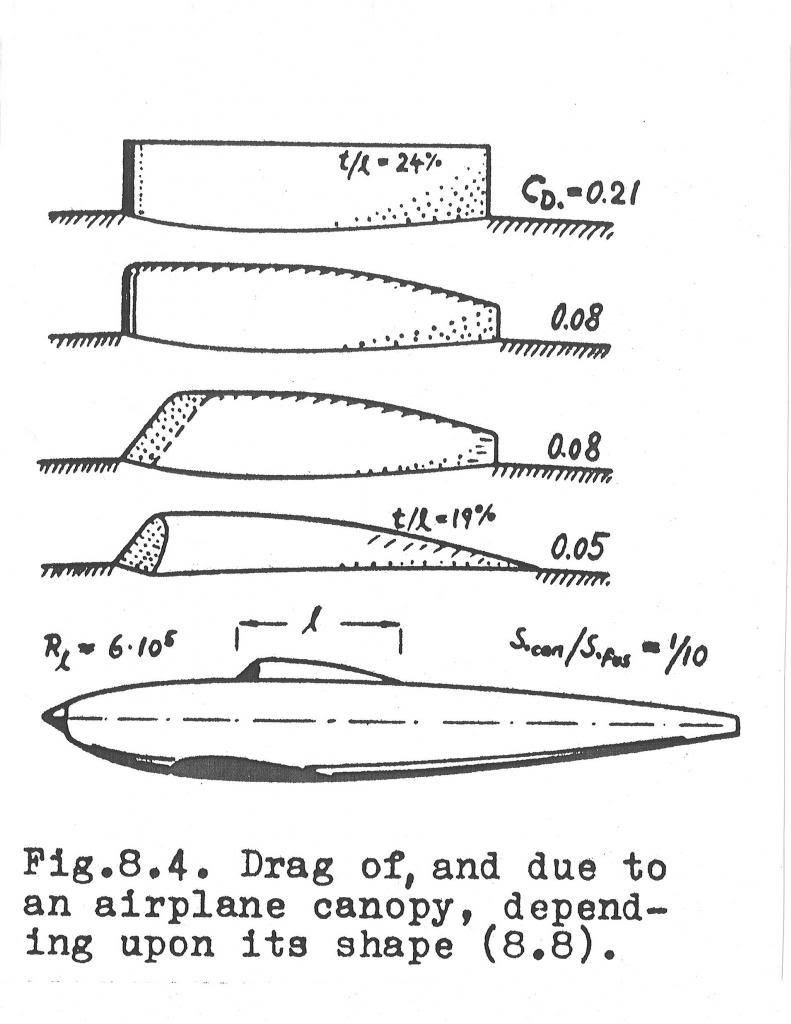
Here's a canopy drag table adapted from Goro Tamai's 'THE LEADING EDGE'
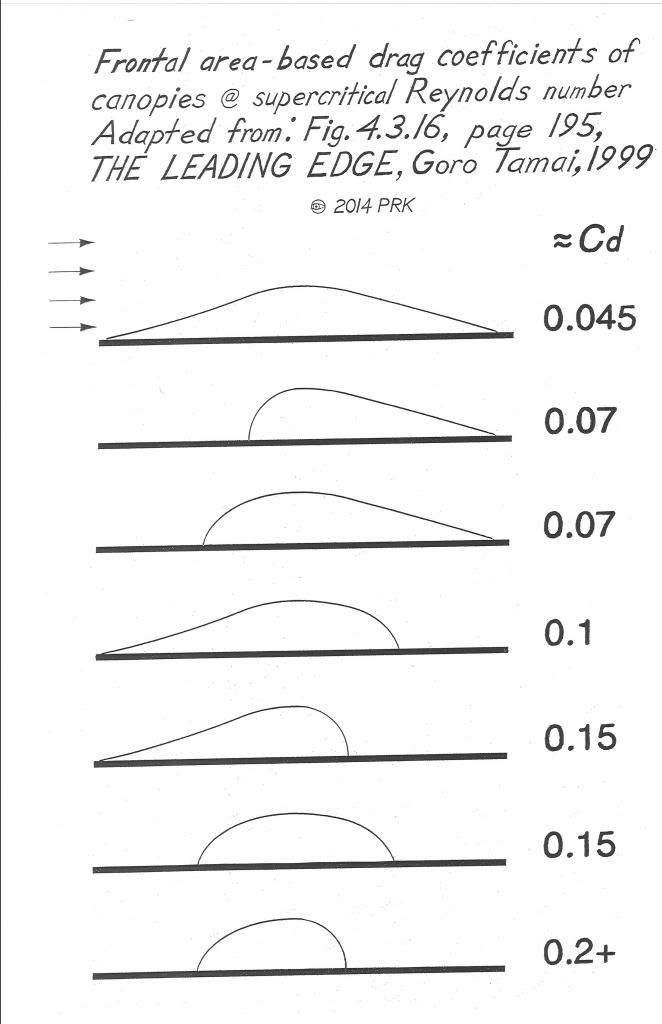
__________________
Photobucket album: http://s1271.photobucket.com/albums/jj622/aerohead2/
Last edited by aerohead; 02-14-2014 at 06:07 PM..
Reason: add Goro Tamai table
|
|
|

|
|
The Following 6 Users Say Thank You to aerohead For This Useful Post:
|
|
 Today Today
|
|
|
|
 Other popular topics in this forum...
Other popular topics in this forum...
|
|
|
|
 09-07-2013, 08:37 PM
09-07-2013, 08:37 PM
|
#2 (permalink)
|
|
Master EcoModder
Join Date: Jan 2010
Location: Alberta Canada
Posts: 744
Thanks: 81
Thanked 75 Times in 67 Posts
|
Having just return from the BUB motorcycle speed week at Bonneville it was interesting to wander around the pits to see what people are doing with/to there semi-streamlined bikes. The first thing that stands out is the lack of any attempt to deal with the tail section. This is mostly due to the class rules not allowing anything further back than 8" behind the rear wheel & a height limit for the seat behind the rider. one could of course start from 8" behind the rear wheel and see what kind of motorcycle would fit, but the rear seat height limit would remain, and it would be far easier to build something for the RWB [run what you brung], so no world records. For the most part it seemed to me that many of the class records at Bonneville are more about horsepower than aerodynamics.
The Vetter aproach is far more condusive to the development of good aerodynamics, so your posting will be far more usefull to the FE set. Do you know of any research/testing of air foil sections with opening on the sides like a stream lined motorcycle? It would be interesting to see what gives when an opening is introduces...
|
|
|

|
 09-09-2013, 10:55 AM
09-09-2013, 10:55 AM
|
#3 (permalink)
|
|
EcoModding Lurker
Join Date: Mar 2012
Location: syracuse,ny
Posts: 45
Thanks: 17
Thanked 6 Times in 6 Posts
|
Would it be wrong to assume a slight flair outward, just before the side opening would create a minimal adverse effect? I think as long as the area behind the opening was slightly narrower than the the area in front of the opening, the adverse airflow would
be minimized, so in a practical sense, be a non-issue.
|
|
|

|
 09-09-2013, 06:32 PM
09-09-2013, 06:32 PM
|
#4 (permalink)
|
|
Master EcoModder
Join Date: Feb 2009
Location: France - Paris
Posts: 762
Thanks: 188
Thanked 33 Times in 30 Posts
|
Quote:
Originally Posted by minimac

Would it be wrong to assume a slight flair outward, just before the side opening would create a minimal adverse effect? I think as long as the area behind the opening was slightly narrower than the the area in front of the opening, the adverse airflow would
be minimized, so in a practical sense, be a non-issue.
|
3rd pictures, there might be the answer :
Accident along the way (2nd shape, 0,29 Cd) vs no accident (4th shape, 0,16 Cd)
Twice as much Cd, overal shape being equal ...
__________________

|
|
|

|
 09-09-2013, 07:32 PM
09-09-2013, 07:32 PM
|
#5 (permalink)
|
|
Master EcoModder
Join Date: Jan 2008
Location: Sanger,Texas,U.S.A.
Posts: 16,379
Thanks: 24,466
Thanked 7,403 Times in 4,797 Posts
|
opening
Quote:
Originally Posted by redyaris

Having just return from the BUB motorcycle speed week at Bonneville it was interesting to wander around the pits to see what people are doing with/to there semi-streamlined bikes. The first thing that stands out is the lack of any attempt to deal with the tail section. This is mostly due to the class rules not allowing anything further back than 8" behind the rear wheel & a height limit for the seat behind the rider. one could of course start from 8" behind the rear wheel and see what kind of motorcycle would fit, but the rear seat height limit would remain, and it would be far easier to build something for the RWB [run what you brung], so no world records. For the most part it seemed to me that many of the class records at Bonneville are more about horsepower than aerodynamics.
The Vetter aproach is far more condusive to the development of good aerodynamics, so your posting will be far more usefull to the FE set. Do you know of any research/testing of air foil sections with opening on the sides like a stream lined motorcycle? It would be interesting to see what gives when an opening is introduces...
|
I added another table above for a Clark Y section with slots of differing position and their influence on the Cd.
__________________
Photobucket album: http://s1271.photobucket.com/albums/jj622/aerohead2/
|
|
|

|
 09-09-2013, 07:45 PM
09-09-2013, 07:45 PM
|
#6 (permalink)
|
|
Master EcoModder
Join Date: Jan 2008
Location: Sanger,Texas,U.S.A.
Posts: 16,379
Thanks: 24,466
Thanked 7,403 Times in 4,797 Posts
|
effect
Quote:
Originally Posted by minimac

Would it be wrong to assume a slight flair outward, just before the side opening would create a minimal adverse effect? I think as long as the area behind the opening was slightly narrower than the the area in front of the opening, the adverse airflow would
be minimized, so in a practical sense, be a non-issue.
|
Once the air gets to a void,it turns 90-degrees and goes in.It must have a solid surface to support flow.
That's not to say that the outer-lying flow won't make the 'jump' as Hucho refers to it.
In a dead calm,with only a pure air 'source' from the front,we'd have symmetry,but in a crosswind,the windward static pressure would induce a transverse flow through the body void,setting up vorticity as the jet collides with the flow on the leeward side,tearing the boundary layer to shreds and forcing separation.
You'd want to do 'something!' The hole in the body would not allow traditional spoilers to function as a boundary is necessary to capture a locked-vortex.
__________________
Photobucket album: http://s1271.photobucket.com/albums/jj622/aerohead2/
|
|
|

|
 09-10-2013, 02:30 AM
09-10-2013, 02:30 AM
|
#7 (permalink)
|
|
Master EcoModder
Join Date: Feb 2009
Location: France - Paris
Posts: 762
Thanks: 188
Thanked 33 Times in 30 Posts
|
What about putting the void under pressure from the cabin by using cooling flow for example ?
__________________

|
|
|

|
 09-10-2013, 06:16 PM
09-10-2013, 06:16 PM
|
#8 (permalink)
|
|
Master EcoModder
Join Date: Jan 2008
Location: Sanger,Texas,U.S.A.
Posts: 16,379
Thanks: 24,466
Thanked 7,403 Times in 4,797 Posts
|
cooling flow
Quote:
Originally Posted by renault_megane_dci

What about putting the void under pressure from the cabin by using cooling flow for example ?
|
Aerodynamically,it's a sound proposal,as Dr. Wunibald I. Kamm is famous for using cooling air ejected at the windshield base to help re-energize the boundary layer there where it was tending to stall over the windshield.
The hitch would be fair-weather riding,where the heat flux coming off the radiator would be unwelcome to the rider.
With a nose scoop as on the E-Z-HOOK LSR streamliner,you might be able to create a stabilizing curtain of air.You'd lose some kinetic energy to heating aside from what the engine was rejecting,but worth a shot.
A wind tunnel would sure be handy for sorting this kind of thing out.
Professor Alberto Morelli spent untold hours in the Pininfarina wind tunnel designing the air extractors for the 1978 CNR 'banana' car.And at $1,000/hour,in 1978 dollars,that's a lot of Lira. 
__________________
Photobucket album: http://s1271.photobucket.com/albums/jj622/aerohead2/
|
|
|

|
 09-10-2013, 06:53 PM
09-10-2013, 06:53 PM
|
#9 (permalink)
|
|
Master EcoModder
Join Date: Jan 2008
Location: Sanger,Texas,U.S.A.
Posts: 16,379
Thanks: 24,466
Thanked 7,403 Times in 4,797 Posts
|
4-new drag tables
I've added four additional pictorial drag tables up at the top of the thread.
Of particular interest to motorcyclists will be the 'wing/strut sections' table.
The center section has the lowest drag of traditional symmetrical sections,with a thickness-to-chord ratio of 3.92.
The upper,very thin section suffers from an overdose of surface friction drag.
The bottom 'stubby' section suffers from separation-induce pressure drag.
--------------------------------------------------------------------------
The center lowest-drag section is at the crossroads of the drag curves for surface friction and pressure drag.It's right at the 'sweet spot.'
If the section is any shorter,it suffers separation.
If it's any longer,it's surface friction begins to climb.
--------------------------------------------------------------------------
From a purely aerodynamic standpoint,your streamlined bike should be as near to the center profile as you can make it,when viewed from above.
The drag curve in this region is rather flat,like a nice torque curve with a stump-pulling engine.So you've got some wiggle room dimension wise.But you won't want to stray too far afield.
__________________
Photobucket album: http://s1271.photobucket.com/albums/jj622/aerohead2/
|
|
|

|
 09-13-2013, 07:29 PM
09-13-2013, 07:29 PM
|
#10 (permalink)
|
|
Master EcoModder
Join Date: Jan 2010
Location: Alberta Canada
Posts: 744
Thanks: 81
Thanked 75 Times in 67 Posts
|
One question I do have is what or how much does the void volume inside the fairing matter? I am wondering if filling the void with solid stuff reduces the mass of air that is involved in causing drag? My suspision is that the relationship is not linier and that there is no way to make the space between the windshiel and the cargo bay full enough to have much effect anyway. Has any one done any research on opening size/volume and drag for bluff bodies?
|
|
|

|
|